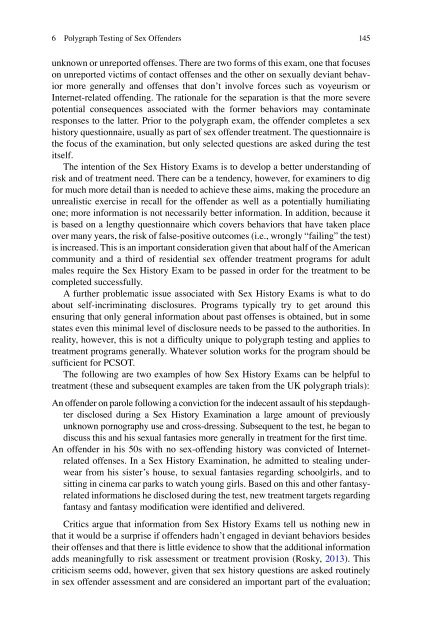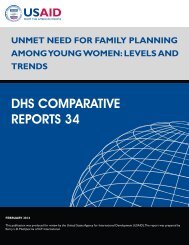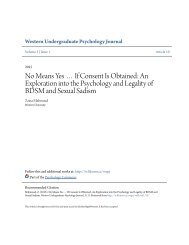Treatment of Sex Offenders
N0JsYq
N0JsYq
Create successful ePaper yourself
Turn your PDF publications into a flip-book with our unique Google optimized e-Paper software.
6 Polygraph Testing <strong>of</strong> <strong>Sex</strong> <strong>Offenders</strong><br />
145<br />
unknown or unreported <strong>of</strong>fenses. There are two forms <strong>of</strong> this exam, one that focuses<br />
on unreported victims <strong>of</strong> contact <strong>of</strong>fenses and the other on sexually deviant behavior<br />
more generally and <strong>of</strong>fenses that don’t involve forces such as voyeurism or<br />
Internet- related <strong>of</strong>fending. The rationale for the separation is that the more severe<br />
potential consequences associated with the former behaviors may contaminate<br />
responses to the latter. Prior to the polygraph exam, the <strong>of</strong>fender completes a sex<br />
history questionnaire, usually as part <strong>of</strong> sex <strong>of</strong>fender treatment. The questionnaire is<br />
the focus <strong>of</strong> the examination, but only selected questions are asked during the test<br />
itself.<br />
The intention <strong>of</strong> the <strong>Sex</strong> History Exams is to develop a better understanding <strong>of</strong><br />
risk and <strong>of</strong> treatment need. There can be a tendency, however, for examiners to dig<br />
for much more detail than is needed to achieve these aims, making the procedure an<br />
unrealistic exercise in recall for the <strong>of</strong>fender as well as a potentially humiliating<br />
one; more information is not necessarily better information. In addition, because it<br />
is based on a lengthy questionnaire which covers behaviors that have taken place<br />
over many years, the risk <strong>of</strong> false-positive outcomes (i.e., wrongly “failing” the test)<br />
is increased. This is an important consideration given that about half <strong>of</strong> the American<br />
community and a third <strong>of</strong> residential sex <strong>of</strong>fender treatment programs for adult<br />
males require the <strong>Sex</strong> History Exam to be passed in order for the treatment to be<br />
completed successfully.<br />
A further problematic issue associated with <strong>Sex</strong> History Exams is what to do<br />
about self-incriminating disclosures. Programs typically try to get around this<br />
ensuring that only general information about past <strong>of</strong>fenses is obtained, but in some<br />
states even this minimal level <strong>of</strong> disclosure needs to be passed to the authorities. In<br />
reality, however, this is not a difficulty unique to polygraph testing and applies to<br />
treatment programs generally. Whatever solution works for the program should be<br />
sufficient for PCSOT.<br />
The following are two examples <strong>of</strong> how <strong>Sex</strong> History Exams can be helpful to<br />
treatment (these and subsequent examples are taken from the UK polygraph trials):<br />
An <strong>of</strong>fender on parole following a conviction for the indecent assault <strong>of</strong> his stepdaughter<br />
disclosed during a <strong>Sex</strong> History Examination a large amount <strong>of</strong> previously<br />
unknown pornography use and cross-dressing. Subsequent to the test, he began to<br />
discuss this and his sexual fantasies more generally in treatment for the first time.<br />
An <strong>of</strong>fender in his 50s with no sex-<strong>of</strong>fending history was convicted <strong>of</strong> Internetrelated<br />
<strong>of</strong>fenses. In a <strong>Sex</strong> History Examination, he admitted to stealing underwear<br />
from his sister’s house, to sexual fantasies regarding schoolgirls, and to<br />
sitting in cinema car parks to watch young girls. Based on this and other fantasyrelated<br />
informations he disclosed during the test, new treatment targets regarding<br />
fantasy and fantasy modification were identified and delivered.<br />
Critics argue that information from <strong>Sex</strong> History Exams tell us nothing new in<br />
that it would be a surprise if <strong>of</strong>fenders hadn’t engaged in deviant behaviors besides<br />
their <strong>of</strong>fenses and that there is little evidence to show that the additional information<br />
adds meaningfully to risk assessment or treatment provision (Rosky, 2013 ). This<br />
criticism seems odd, however, given that sex history questions are asked routinely<br />
in sex <strong>of</strong>fender assessment and are considered an important part <strong>of</strong> the evaluation;





